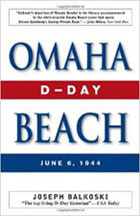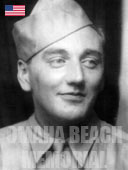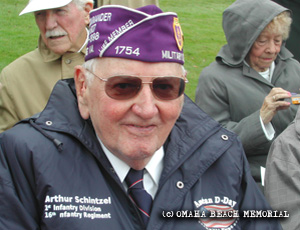| Plan a trip : |  |
| |
|
 |
Trump to visit France for D-Day 75th anniversary
US President Donald Trump is to visit Normandy in June this year for the 75th anniversary commemorations of D-Day, he has said. Mr Trump made the announcement during a reception of World War II veterans in the Presidential Oval Office, at the White House, in Washington DC. [Connexion France] Read more...
[Posted: 2019-04-30 09:01:00]
US President Donald Trump is to visit Normandy in June this year for the 75th anniversary commemorations of D-Day, he has said. Mr Trump made the announcement during a reception of World War II veterans in the Presidential Oval Office, at the White House, in Washington DC. [Connexion France] Read more...
[Posted: 2019-04-30 09:01:00]
Bernard DARGOLS, 98, died April 28, 2019
We have just learned that Bernard DARGOLS has died. Bernard DARGOLS landed on Omaha Beach with 2nd Infantry Division. Read more...
[Posted: 2019-04-29 22:00:00]
We have just learned that Bernard DARGOLS has died. Bernard DARGOLS landed on Omaha Beach with 2nd Infantry Division. Read more...
[Posted: 2019-04-29 22:00:00]
| LAHAYE EDWARD J 8TH AIR FORCE |
Honored by Lil Metzger
[Posted: 2023-07-23 04:48:28]
| COPENHAVER JAMES E 90TH INFANTRY DIVISION |
Honored by Jim Shafer
[Posted: 2023-06-11 01:08:37]
| OMAHA BEACH MEMORIAL - TESTIMONIES | |
 |
Partager |
| Private First Class Arthur Schintzel 1st Infantry Division 16th Infantry Regiment 1st Battalion Company B |
|
We were 11 miles out to sea in our transport. We were off-loaded on our boats by davits, instead of having to climb down the cargo nets I alluded to earlier -- we had full combat loads and ammo and everything - and walked into the LCVP we were assigned to. They lowered us down into the water and we took off on our assigned formation to the beach. The water was choppy. We were in fine shape until - this started 11 miles out mind you - when we got within small arms range of the enemy on the shore, the bullets began to bang and ricochet off the metal ramp of the landing craft, splash around in the water alongside us. We would have gone in. Sometimes the rounds would make a hit and disable a boat, or if the troops aboard were persistent and having their necks up too high they'd probably get their helmet shot off or worse. It was not a bad day, a little bit windy and that produced the chop along with the weight of the bouncing boats or ships. Our particular coxs'un for our boat, which was the LCVP-22 was a former boater and an excellent coxs'un. He took us in at full speed. Shortly before the bow hit the sand, he reversed the throttle and let the bow wave catch up with us, so we rode that huge wave in, which took us onto the sand, or took us in for a dry landing. He still had enough reverse charge left that he could back that boat out without being stuck and being subjected further to enemy fire, which was constant, heavy, furious, killing. It was a day that you wished you were somewhere else or that the situation were different, but neither one of those held. It was a hot, hot, hot contest. They had the advantage in being previously prepared for defense. They had the advantage of height. They could look down at you. You would have trouble finding them when you looked up to search for them because the vegetation was giving them cover. It was a hot conflict. You could feel and sense the rounds going through your uniform. I took four bullet wounds that day - not all at one time. In addition to that I received two almost killing shrapnel wounds - one that took a good piece of my left shoulder off and disabled my arm for years to come. And that was just the start. I got up, finally, almost to the top - a little more than halfway - up the bluff that was giving us all of this fire and that was it. I was not able to proceed further so I just called out for a medic. Several of the troops nearby carried on and picked up my call and, in turn, relayed it down and finally got to the beach. I presume this is the way it worked because soon four medics came racing up to where I was. They raced up to me under fire. These four guys were real heroes. They brought a stretcher along and each took one arm and the other the other arm, the other leg and the fourth appendage and flung me on that stretcher and they picked it up, each one on a corner, and took off back down to the sand dunes at the water's edge. There was an improvised aid station down there - "improvised" - put emphasis on that. You could also include some four-letter military terms but they were doing the best they could under the circumstances, getting their tails shot off the same way ours were. Posted: July 16, 2011 Copyright: Laurent Lefebvre |
|
 Arthur Schintzel - 6 June 2005 |
|

